#kalmykia
Text

Russian saiga Saiga tatarica tatarica
Observed by tcager, public domain
157 notes
·
View notes
Text
The Russian state using ethnic minorities as cannon fodder - with a focus on Buryats
Article written in 2022, update on the Free Buryatia Foundation in September 2023 given at the end of the post.
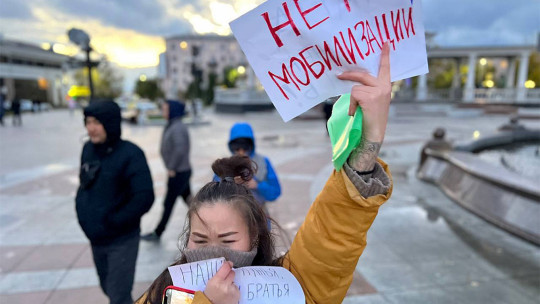
Putin announced on October 14th 2022 that by the end of October, his partial mobilisation process would be complete
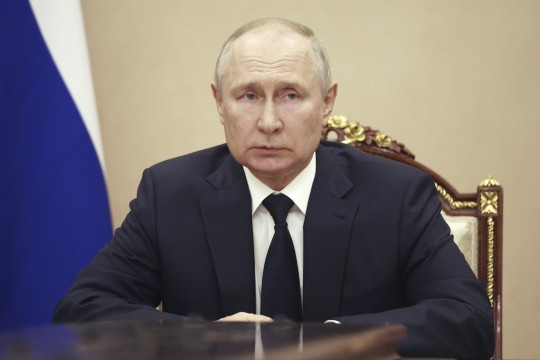
The recruitment target was 300,000. 222,000 were recruited, and it was claimed that there'd be no more plans for future recruitment
The mobilisation process soaked nation wide outrage which lead to mass protests.
It drew in criticism from some of the Russian political elite
The mobilisation process disproportionately affected ethnic minorities/impoverished regions (many impoverished regions have a high ethnic minority population)

Tuva Republic
Regions that held high populations of ethnic minorities bared the brunt of war-related deaths.
Both Ukrainian media and authorities have levelled accusations at Russian ethnic minorities - that they committed war crimes in Bucha, Ukraine
This accusations was made in May 2022 by Lydmyla Denisova, Ukrainian ombudsman for human rights

Buryats and Chechens were being accused of this
This was a form of scapegoating (not to say they 0 ethnic minorities have committed war crimes in Ukraine of course)
The Free Buryat Foundation investigated this and produced a report that challenged the notion that Buryats were ever sent to Bucha, let alone being responsible for the war crimes committed

Victoria Maladaeva is the vice president of the Free Buryatia Foundation.

She said:
Dagestan, Tuva Republic and Buryatia Republic have the highest death tolls
Moscow, with 17 million, had >50 deaths.
Buryatia with only 980,000 had 364
A Buryat is 7.8 x more likely to die in the war compared to an ethnic Russian.
A Tuvan is 10.4x more likely
The biggest losses were at the beginning of the war and numbers gradually decreased.
Mobilisation was first and foremost carried out in ethnic republics
The day Putin announced this, authorities came to Buryatia at night, went into people's homes and took them from their beds.
No one was given draft notices
They even took men with multiple children, men from the same family
Endangered ethnic groups reside in Dagestan

There are very small communities of those people with populations of around 13,000
Despite this, those minorities were still drafted
There are also very small communities in the Sakha Republic.
They are so remote, helicopters are needed to be called for medical treatment
They almost never come because of how remote these communities are
Funnily enough, helicopters came immediately to draft those people upon Putin's announcement
Putin is a Russian imperialist through and through
None Russians are treated like second class citizens
Russian cultural chauvinism is seen even in small things - such as names
Putin would frequently mispronounce Kazakhstan's president's name. If you have an ethnic Buryat name for example, Russians are reluctant to use it, instead assigning you an "easier" Russian name

Kassym-Jomart Tokayev
Unfortunately, many of the people of Buryatia believe in the Russian narrative about Nazi ideology in Ukraine
It is one of the missions of the free Buryatia Foundation to help Buryats understand that this is Russian propaganda
The focus on Buryat/ethnic minority war crimes has a racial element
When an ethnic minority commits a war crime, their ethnicity is singled out
It should not matter the ethnicity of a war criminal
78 Buryat soldiers from the 11th air assault brigade were barred from terminating their contract
They were imprisoned in Luhansk.
Only Ilya Kaminskiy returned. The fate of the other men is unknown
The Free Buryatia Foundation knows they cannot help everyone but they do their best. They help people in terminating their contracts for example and have been quite successful in this.
The Free Buryatia Foundation was established to counter Russian propaganda and to protest the war.
People worldwide took an interest to this, so they founded the free Buryatia Foundation.
The Free Buryatia Foundation is the first ethnic anti war organisation in Russia
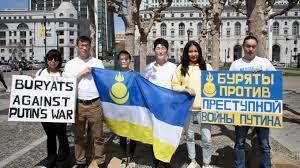
They aided in founding anti war organisations in other ethnic regions such as Tuva, Kalmykia, Udmurtia, Sakha
Many Buryats fled to Mongolia and Kazakhstan
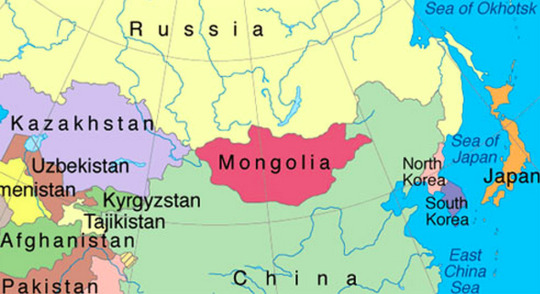
Some men were able to come back after being drafted, some were not
The economic situation for Buryatia is dire. It ranked 81st out of 85 of Russia's regions when it came to living standards
Buryats had to spend money on a list of supplies for war that Russia did not provide them
Very recently, on September 1st, Russia banned the Free Buryatia Foundation, labelling them as undesirable and anti Russian.
Here is the website for the Free Buryatia Foundation:
And here is where you can donate:
Please spread around or give what you can.
#Russia#Russian imperialism#russian colonialism#russian invasion#Ukraine#invasion of ukraine#russian invasion of ukraine#war in ukraine#Buryatia#Tuva#chechnya#Sakha#Yakutia#Kalmykia#Indigenous people of Russia#Asian Russians#indigenous russia#indigenous russian#Native Russia#Native Russians#Russian ethnic groups#Free Buryatia foundation#Free Buryatia#Anti Russia#Russian propaganda#human rights#Russian ethnic minorities
147 notes
·
View notes
Photo

#wmaf#afwm#asian chick#Asian female#asian girls#Asian woman#Buryatia#eurasian#europe#european#happiness#interracial couple#interracial marriage#interracial love#Kalmykia#Kazakhstan#Kyrgyz migrant workers#kyrgyzstan#love#mixed couple#relationship#Russia#russian man#Siberia#White Man#Yakutia#yakutsk#yellow fever
64 notes
·
View notes
Text

my kalmyk son
yeah i copied velt's pose
30 notes
·
View notes
Text
September 25th, 2022
The cries for help of Russia's national minorities: "We will stop existing"
"In small villages, with two or three streets, they have taken all the men" • Putin's draft mobilization punishes regions like Yakutia, Buryatia and Dagestan.
On the day after declaring partial mobilization in Russia, a member of the Duma [Russian Parliament] and ex-mayor of Jakutsk, in Siberia, protested that the number of reserves that each region has to send to the front [of the war in Ukraine] didn't match. She asked why regions like Novosibirsk only mobilize 0.27% of the men between ages 20 and 59 and, at the same time, Yakutia has to mobilize 1.66%. In addition, she added, why are precisely the most disadvantaged towns of the north of Yakutia where the proportion of men called to war is higher? "In villages of the Artic, with 300 inhabitants, they take 47 men. I know what it means to live in the north at -55°C [-67°F] and, without the men, families will have a very hard time. What is the logic behind these numbers? What kind of proportionality are we talking about?"
Yakutia, located north of the permafrost and almost 8,500 km away from Moscow, is a land rich in natural resources (diamonds, uranium, hydrocarbon...) and the immigration of workers for the extraction businesses has left Yakuts and Evens, the indigenous peoples, as a minority in the cities of the centre and south of the Republic. On the other hand, they are the majority in the towns of the north, from which they are now being sent en masse to the frontline.
We have talked to Aanis, a girl from a town of 500 inhabitants where 35 men have been called to war: "They've taken almost all young men from the town, of local ethnicities (Evens and Yakuts). It was very unexpected, nobody could have seen something like this coming. Before the mobilization, people from the town were not interested in the war, it's hard enough to survive. We were worried about everyday problems: hunting, how the vegetables were growing... Now everything has changed, we are shocked."
Nikolai, a man from a village in the north of Yakutia, answers resolutely when we ask what has happened: "We had never seen before what is happening now, not even in the Second World War. They have sent all the native men to the front." I ask him for more details: "My village is inhabited only by Yakuts and Evens. We're less than 500 people, out of which only 154 are of working age, including women. They have called to the front 65 people, almost all the men between ages 18 and 60." He adds that families don't know how they will survive this winter. "It reaches -60°C [-76°F], and we don't have centralised heating or water pipes. We use ovens to warm up and it's usually men who take care of that. We live from hunting. Who will hunt now? What will we eat? Nobody knows."
I ask him why does he think the authorities have decided to take them and not others: "Because we live in remote and very small villages, with no Internet; there are no lawyers here or organizations that defend us. Many of us don't speak Russian or English. They probably calculated that mobilizing us would have little repercussion: very few people would notice the absence of some minorities, even if they disappear completely. In fact, there's already few of us left.
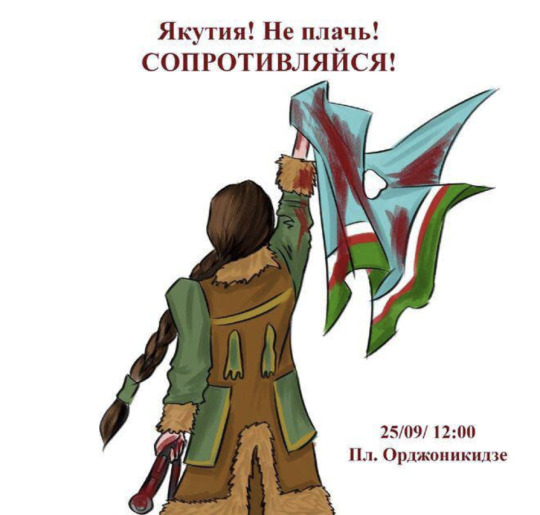
Poster calling for a protest of the Free Yakutia Foundation: "Yakutia! Don't cry! RESIST!"
In Yakutia, women have taken the streets to protest. They stand their ground. And they have done so, shouting "no to genocide!"
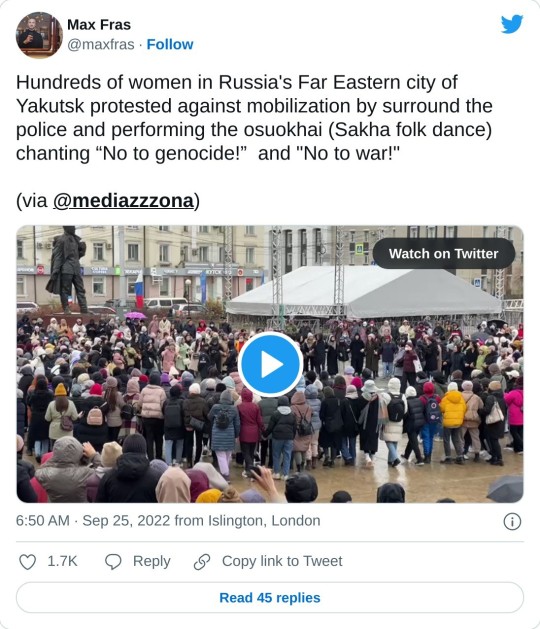
General mobilization in Buryatia
In Buryatia, a republic in the south of Siberia, bordering Mongolia, with a 35% native population of Mongolian origin (Buryats), their situation is just as harsh. "The mobilization in Buryatia is general, not partial", declares Aleksandra Garmazhapova, founder of a local NGO. Viktoriya Maladaeva, coordinator of the Free Buryatia Foundation, confirms it: "They're not calling up only reserves: they mobilize students, disabled people, and people who have never had any relation with the army. In small villages, with only two or three streets, they have taken all the men. There are families where they've called up the fathers and sons." She explains that many men were taken to the recruitment points during the night: "Then people started calling each other, and those who could drove their car to Mongolia. Others have hidden in the forests, in the taiga."
To answer to this situation, the ex-president of Mongolia (2009-2017) Tsakhiagiin Elbegdorj published the following message: "I know that since the beginning of this bloody war, the ethnic minorities that live in Russia are the ones that have suffered the most: the Mongols of Buryatia, of Tuva and Kalmykia have suffered. They have been used as cannon fodder. We, the Mongols, will welcome you with open arms and hearts. Our borders will stay open."
To the question of why she thinks Buryatia is disproportionately affected by the mobilization, Maladaeva answers without a doubt: "Because we are an ethnic minority and for Putin we are worthless [...] And that's the same in other "ethnic republics": right now we're getting calls from activists from Kalmykia, Chuvashia, Yakutia, Tuva... On the contrary, in the Irkutsk region (where there is a Slavic majority without notable minorities), there's silence, even though it borders us. Why?"
Dead in combat
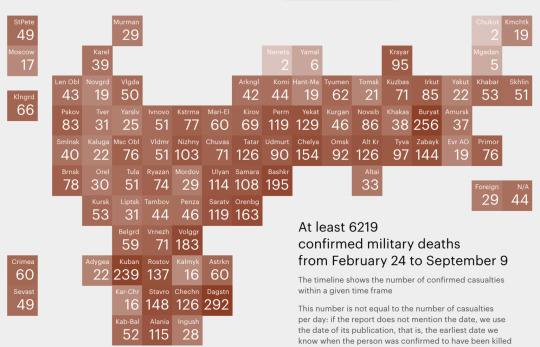
"Russian victims in Ukraine". Data compiled by Mediazona.
We must highlight that, until Putin signed the decree to mobilize reserves last Wednesday, going to fight in Ukraine was voluntary and paid. Those interested signed a contract with the Russian army and got paid a monthly salary between 130,000 and 200,000 rubles, depending on the region.
These salaries might not be much in Moscow, but they are a fortune in the most deprived areas. In the Russian capital city, the average monthly wage is about 115,009 rubles, three times the average monthly wage in Buryatia. If we look at unemployment rates, we see how it's 1.5% in Saint Petersburg while in Northern Caucasus republics, such as Ingushetia, it's as high as 30%. In the context of these economic inequalities, a result of highly centralized policies that center the economic wealth around the cities where political power resides and regulate the periphery to misery, it's no surprise that Buryats and Caucasians see an opportunity in an army wage, and knowing that in the worst of cases, if they die in combat, their families will receive (in theory) a compensation of 7 million rubles and a pension.
These economic reasons explain, in part, why the two regions with the most soldiers who died in combat in Ukraine are Buryatia and Dagestan (in the northern Caucasus). According to official data compiled by the Russian news portal Mediazona, 6,219 Russian soldiers have died in total in the war in Ukraine. From Buryatia, 256 have died (out of a total of 1 million inhabitants), and from Dagestan, 292 (out of 2.5 million inhabitants). These numbers contrast highly with the 17 dead soldiers from Moscow (12 million inhabitants) or the 49 deaths from Saint Petersburg (5 million inhabitants).
"We are the empire's trash"
Another factor that deepens the marginalization of minorities in Russia, that could have contributed to their disproportionate enlistment, is the prevailing racism in Russian society. Maria Viushkova, analyst of the Free Buryatia Foundation, declared in an interview: "The best alternatives in Buryatia for finding a job are either emigrating to South Korea or joining the army. For us, it's difficult to find work in other regions of Russia, where Buryats have to face discrimination and racism: they don't hire them, they don't house them, they limit their education. Often, Buryats who have tried their luck in other regions of Russia are forced to come back."
Aslan is a man from Kabardino-Balkaria, near Dagestan. He confirms that racism towards Caucasians is noticeable in Moscow, where he worked in some years: "It's constant. At work, first they looked badly at me, it took them a while to trust me. And when they knew me well, sometimes they spoke badly of Caucasians using a slur that they use to define us, "chernojopie" (black butts), not even realising I was there. In the subway, I have had problems with nationalists because of my looks. And my child has had quarrels with his friends for not being "Russian".
I ask him why he thinks it's them and Siberian minorities who are the most affected by this war. He's resolute: "Because we are the empire's trash to the Kremlin, and this is a way to get rid of us." And he adds: "But I don't understand why the Northern peoples don't rebel against Moscow, the empire has also wanted to destroy them. I think mobilization hasn't been as numerous in our republics in the Caucasus as it has in the Far East because they don't dare to, they know we'll stand up to them."
Aslan is probably right. The Caucasus is a potentially explosive region, where there was for years a Jihadist armed group made of young radicalized people with no hopes for the future. Authorities are not interested in feeding discontent and rage among these young people.
But in the Far East and in Siberia the situation is different, and the natives make a request of us. When I asked Nikolai, from the village in Yakutia that has been left with no young men, how could we help them, he said: "Please, report about the minority nations. If all men go to war, the genetic reserve of our people will be gone. In 20 years, or 40 years, our language will also go extinct. We will stop existing."
#war in ukraine#ukraine invasion#national minorities#ethnic minorities#russia#racism#yakutia#buryatia#dagestan#siberia#indigenous#evens#yakuts#tuva#kalmykia#kabardino-balkaria#caucasus#stateless nations#💬#genocide
237 notes
·
View notes
Text
Kalmykian woman speaks up
#indigenous#culture#indigenous russia#indigenous russian#russia#important#fypシ#colonization#fypage#landback#kalmyk#kalmykia#indigenous art#indigenous rights#indigenous people#siberia#siberian indigenous#indigenous siberian
35 notes
·
View notes
Video
Elista 14 by Alexxx Malev
Via Flickr:
Russia. Elista, pigeons
Элиста, голуби
#2015#bird#elista#kalmykia#may#pigeon#russia#spring#весна#голуби#калмыкия#май#птица#россия#элиста#flickr#russian tumblr#русский tumblr
7 notes
·
View notes
Text

Farewell, Kalmyk land! 1993
Прощай, земля калмыцкая! 1993
Artist Grigory Bembeev
In memory of the deportation of the Kalmyks
#mongolic#non-russian#indigenous russian#indigenous russia#Kalmykia#Калмыкия#Kalmyks culture#Культура Калмыки#colonization#decolonize#russian imperialism#русский империализм#artist
29 notes
·
View notes
Photo
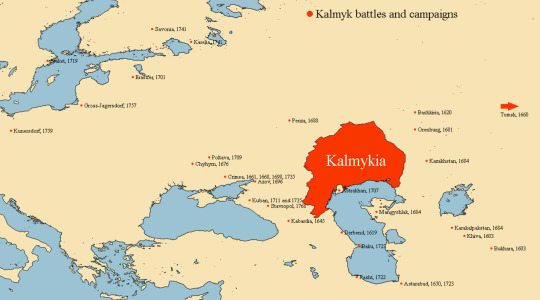
Tibetan Buddhist Mongol Kingdom of Kalmykia.
110 notes
·
View notes
Photo


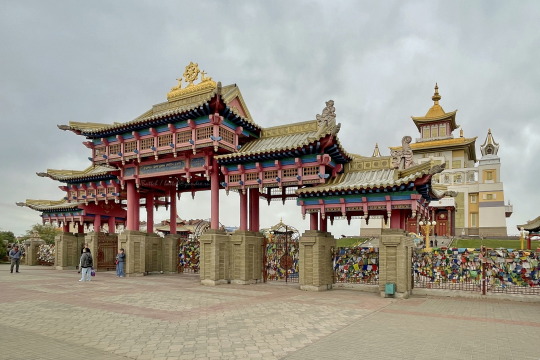

The Golden Place of Buddha Shakyamuni, Elista, Kalmykia
#buddhism#buddha#eli stabler#Russia#kalmykia#house of worship#khurul#travel blog#architecture#archdaily#sacred place#хурул#Элиста#Россия#Калмыкия#золотая обитель#архитектура#буддизм#phone photography#my photography
21 notes
·
View notes
Text
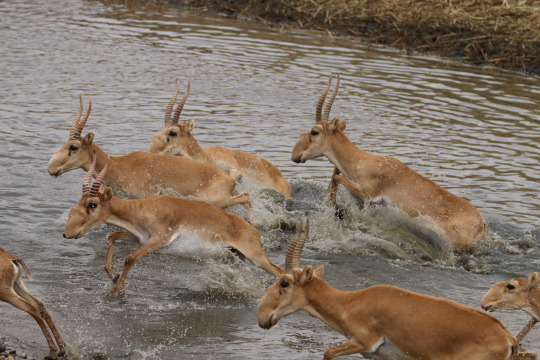
Russian saiga Saiga tatarica tatarica
Observed by nestboxer, CC BY-NC
85 notes
·
View notes
Text
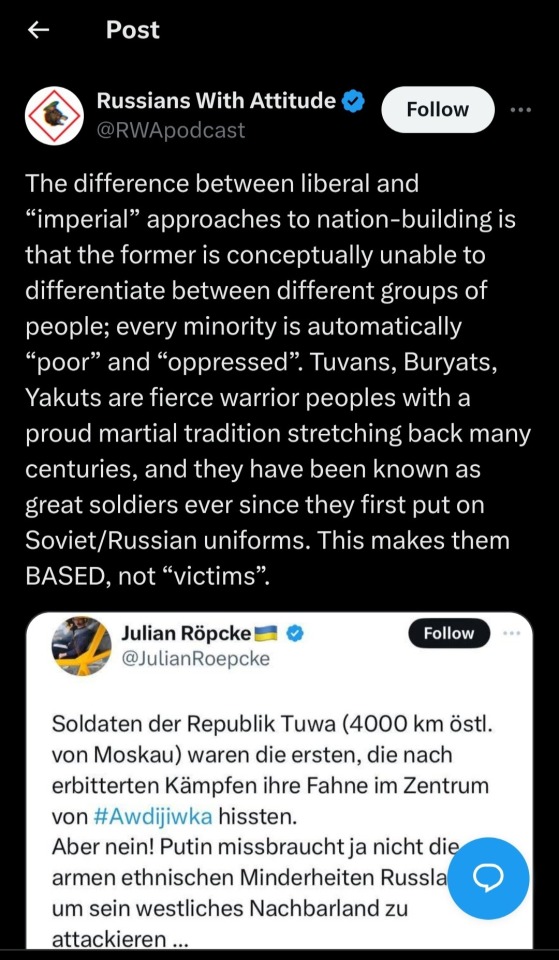
Russians pretending like the way they treat their ethnic minorities is some sort of Gold standard is fucking comical. Yes, Buryats, Tuvans and other ethnic minority groups being disproportionately mobilised in an imperial war by their coloniser so privileged Muscovites can never face the war themselves is so BASED ! Tell that to all of those Buryats/Kalmyks/Tuvans etc protesting and fleeing the country to escape being drafted.
Anyways
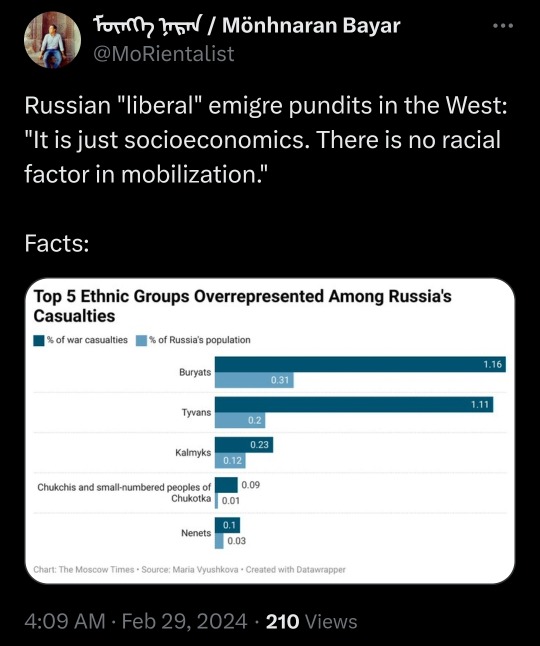
So "BASED"!
#Russia#russian invasion#Ukraine#Russian imperialism#russian colonialism#russian agression#Buryatia#Tuva#Kalmykia#Chukotka#Nenets#Chukchi#indigenous russia#The Russian couldn't even stop themselves from being racist in the tweet what the fuck is “fierce warrior people” oh my god
76 notes
·
View notes
Text

#wmaf#afwm#asian chick#Asian female#asian girls#Asian woman#Buryatia#eurasian#europe#european#hapiness#interracial couple#interracial marriage#interracial love#Kalmykia#Kazakhstan#Kyrgyz migrant workers#kyrgyzstan#love#mixed couple#relationship#Russia#russian man#Siberia#White Man#Yakutia#yakutsk#yellow fever
10 notes
·
View notes
Text
Maria Ochir-Goryaeva: "Independence Is a Necessity"
Maria Ochir-Goryaeva and Christoph Heusgen, chairman of the Munich Security Conference, February 2023. Courtesy of RFE/RL
When Russia invaded Ukraine, national movements in Russia’s regions advocating secession from Moscow were given a new impetus. A number of analysts have seriously argued that Russia could break up if there is a turning point in the war and noted the particular role of the…

View On WordPress
#ethnic republics#independence movements in Russia#Kalmykia#Maria Ochir-Goryaeva#Russian colonialism#Russian emigres#Russian imperialism#Russian invasion of Ukraine#separatism
0 notes


